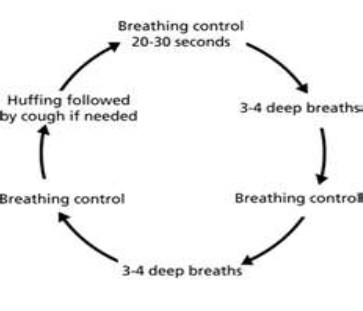Chest trauma
This page explains what can cause chest trauma and chest wall damage. It also provides advice to help with your recovery.
What is chest trauma?
Chest trauma is a common injury following a blow to the chest or falling heavily onto your chest. This can include broken ribs which usually heal without any problems.
Severe pain in the chest which is made worse by coughing, laughing or deep breathing is very common. You may need to take pain relief to allow you to deep breathe, cough and move around comfortably.
Managing your recovery
- Control your pain by taking regular pain relief, such as paracetamol or medication prescribed by your GP or pharmacist.
- It is important to breathe comfortably and take deep breaths. We recommend that you follow the breathing exercises listed towards the end of this page.
- Avoid sitting or resting in bed for long periods of time. During the day get up and walk a short distance every hour.
- Stop smoking - visit https://hlsglos.org/stop-smoking/ for advice and support or call 0800 755 5533.
Pain management
Pain may last up to 8 weeks following your injury but will gradually improve. It is important to continue taking pain relief regularly. If you have not been advised about which pain relief to take, please discuss this with your GP or pharmacist.
Many medicines can cause constipation so it is important to eat fresh fruit, vegetables and drink plenty of fluids to prevent this. While constipation can be a normal side effect, if you have not opened your bowels in more than 3 days, you should ask your GP for advice.
Breathing exercises
After trauma to your chest, you may find that the pain makes it difficult to take a deep breath. If you find that you have excess phlegm, practicing the breathing exercises will help you to clear it.
To support your recovery, please complete the following breathing exercises every hour:
Relaxed breathing
Sit in a comfortable position and place one hand on your abdomen. Breathe in gently and slowly through your nose, and then out through your nose or mouth.
You should feel your abdomen rise while your chest remains mostly still. Keep your shoulders relaxed.
Deep breathing
Take a deep breath in, keep your shoulders relaxed and hold for 3 to 4 seconds and repeat 3 or 4 times. Return to relaxed breathing.
Huffing to clear phlegm
To huff, imagine that you need to steam up your glasses. Complete 1 to 2 huffs and then cough. Return to relaxed breathing.

Continue this sequence as part of your breathing exercises or until the phlegm is cleared. If you find it is painful to cough, try supporting the painful area with a rolled-up towel.
Other things that can help aid your recovery
Heat pack
Can help muscles to relax and improve the blood supply to area. Do not place a heat pack over significant bruising or broken skin. Always make sure you have a barrier such as a towel, between heat pack and skin. Apply the heat for 20 minutes at a time.
Ice pack
This can be effective for sternal fractures (front and centre of your chest) and help with reducing swelling/bruising. Make sure you have a barrier such as a towel between ice pack and your skin. Apply for 20 minutes at a time.
Positioning
Position pillows to support yourself. For a period of time, you may find sitting/sleeping upright more comfortable.
Getting in and out of bed
Roll onto the side of your body that is least painful and support yourself into sitting using your arms and upper body as much as possible. Due to pain, this may take you longer than usual.
Getting dressed
Wear loose fitting clothes so that you do not have to twist your upper body when getting dressed. If you are struggling, consider sitting down to get dressed.
Pacing yourself
This means doing a steady amount of exercise or activity every day. Monitor your pain level and gradually increase the amount of time you spend on your activity.
You may need some support with practical tasks, but you should aim to complete everyday tasks as your pain allows.
Returning to normal activity
Strenuous activities and lifting should be avoided for 4 to 6 weeks following a rib fracture.
After this time, you can begin to take part in physical activity as your pain allows. You may need to adapt your activities at first. To avoid further injury, contact sports such as football or rugby should not be attempted for 6 weeks.
Driving
Make sure you are able to wear a seatbelt safely and can perform manoeuvres and an emergency stop without excess pain before driving. You should not drive while under the influence of opioids (strong pain relief). If you have any questions or concerns about driving, please contact your GP.
Concerns
Please contact your GP or NHS 111 for advice if:
- your pain suddenly increases and you are having difficulty breathing.
- your chest feels tight.
- you have an uncontrollable cough.
- you cough up blood.
- you cough up thick discoloured phlegm.
- you have a high temperature.
- you feel generally unwell.
- you have an increased pain in your chest which stops you from being able to take a deep breath or cough.
Contact information
If you need any further advice about your injury or pain relief, please contact your GP or NHS 111 for advice.